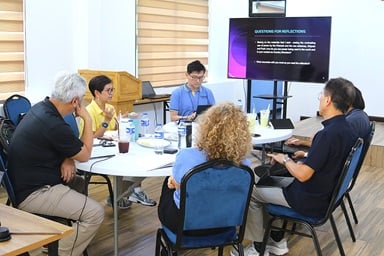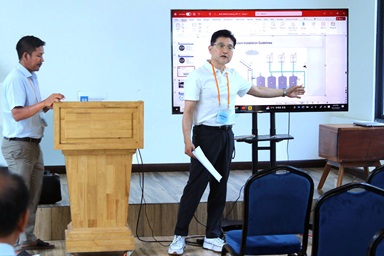Hundreds of people from all walks of life held peaceful rallies before and during the first State of the Nation Address July 25 by President Rodrigo R. Duterte of the Philippines.
Three United Methodist bishops — Bishop Rodolfo A. Juan, Manila area; Bishop Ciriaco Q. Francisco, Davao area, and Retired Bishop Solito K. Toquero — led an ecumenical prayer and communion service during the rallies.
Other church members and seminarians from Union Theological Seminary, the Aglipay Central Theological Seminary and Saint Andrew's Theological Seminary took part, along with members of Kasimbayan and the Promotion of Church People's Response.
Juan said that this State of the Nation Address has been the most peaceful he had witnessed.
"There were no barricades. The police were just standing and unarmed," he explained.
"His (Duterte’s) emphasis on no separation between God and state is commendable; he really has a sense of religiosity and spirituality," the bishop noted.
"His peaceful way of dealing with conflict is also commendable. The unilateral ceasefire with the left groups is really a way of unifying people."
Juan appealed to The United Methodist Church in the Philippines as a whole “to give President Duterte a chance to fight drugs, criminality and poverty."
Common table
A common table called a Hapag Ng Kapayapaan (table for peace) was set up, from which boiled bananas and boiled sweet potatoes were served.
Darlene Marquez-Caramanzana, a United Methodist deaconess, said the food was offered "to celebrate the communion of church people with the whole nation, seeking and pushing for genuine change."
The State of the Nation Address was delivered in an atmosphere of hope, she noted.
"People of all walks of life have been so expectant of that promised change … not coated in high-meaning and sophisticated language but in language that is easily understood by the common people."
Those who have that hope, Marquez-Caramanzana said, "had been deceived so many times by empty promises of the past presidents."
Francisco called it “historical” that church leaders were allowed to give the ecumenical prayer at the gate of the Batasang Pambansa complex, the headquarters of the House of Representatives of the Philippines.
On Unilateral Ceasefire
Duterte, Francisco added, “addressed all concerns in attaining peace and justice, economic development and needs of workers."
Francisco said the president’s attention to the need for a unilateral ceasefire in Mindanao is good for that region, which has been reeling from recent violence against farmers and indigenous people in Kidapawan City.
“Praise God, I cried upon hearing the unilateral declaration on ceasefire,” wrote the Rev. Egmedio Equila Jr., in a message after the address. “While there should be a separation between church and state, there should not be a separation between God and state.”
Equila, assigned to Barker Methodist Church in Singapore, appreciated that the president said he would put an agency in place to protect overseas workers. "I think all we have to do is to pray for him to really attain all of his plan, especially for the overseas Filipino workers," he said.
Marquez-Caramanzana said she is particularly hopeful in the good prospects for the resumption of the peace talks. "Peace has been a primary issue among church women because we want to nurture a world where peace and justice embrace each other," she pointed out.
Mangiduyos is a correspondent for United Methodist News Service.
News media contact: Vicki Brown, news editor, [email protected] or 615-742-5470.
Like what you're reading? Support the ministry of UM News! Your support ensures the latest denominational news, dynamic stories and informative articles will continue to connect our global community. Make a tax-deductible donation at ResourceUMC.org/GiveUMCom.




